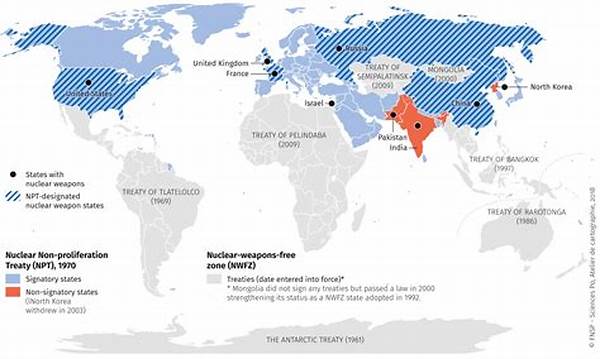Historical Context and Evolution
The quest for global nuclear disarmament efforts has been a focal point in international diplomacy since the mid-20th century. As the devastating effects of nuclear weapons became apparent post-World War II, international communities recognized the need for stringent measures to prevent nuclear proliferation. Various treaties, such as the Treaty on the Non-Proliferation of Nuclear Weapons (NPT) established in 1968, epitomize early attempts to control the spread of nuclear arms. These efforts sought to balance disarmament with the peaceful use of nuclear energy. Since then, numerous multilateral initiatives have pushed for comprehensive disarmament, emphasizing the elimination of nuclear arsenals, enhancing verification mechanisms, and fostering cooperation among nuclear and non-nuclear states alike.
Key International Agreements
Global nuclear disarmament efforts are supported by a series of pivotal international agreements. The Comprehensive Nuclear-Test-Ban Treaty (CTBT) seeks to prohibit all nuclear explosions, evidencing a significant aspect of disarmament objectives. Additionally, the Strategic Arms Reduction Treaty (START) exemplifies bilateral attempts, particularly between the United States and Russia, to significantly cut down their nuclear arsenals. Alongside these, regional treaties like the Treaty of Tlatelolco establish nuclear-weapon-free zones, further underscoring the global commitment to a nuclear-free world.
Challenges and Obstacles
Despite substantial progress in global nuclear disarmament efforts, formidable challenges persist. The emergence of new nuclear states and advancements in nuclear technology present significant hurdles. Moreover, geopolitical tensions and national security concerns often impede disarmament initiatives. Trust deficits and verification challenges continue to complicate enforcement and compliance, necessitating complex diplomatic negotiations and technological advancements in monitoring capabilities.
The Role of Non-Governmental Organizations (NGOs)
Non-Governmental Organizations play a crucial role in global nuclear disarmament efforts. They act as advocates, pressuring governments to adhere to disarmament commitments. Organizations such as the International Campaign to Abolish Nuclear Weapons (ICAN) have been instrumental in shaping public opinion and catalyzing policy changes. Furthermore, these organizations facilitate dialogue and provide a platform for civil society to voice their concerns, thereby fostering a broader consensus towards disarmament.
1. NGOs advocate for stringent disarmament policies, influencing government actions.
2. They engage in public education, highlighting the risks associated with nuclear weapons.
3. Collaborative efforts with international bodies enhance their impact on disarmament initiatives.
4. NGOs critically monitor treaty compliance, holding states accountable.
5. They promote transparency and open dialogue between governments and citizens.
The Future of Global Nuclear Disarmament
Global nuclear disarmament efforts face an uncertain future amidst evolving geopolitical landscapes. As nations modernize and expand their nuclear capabilities, the urgency for renewed disarmament commitments intensifies. Technological advancements present new opportunities for verification, yet they simultaneously pose novel risks. The future of disarmament initiatives necessitates a balanced interplay between innovation, diplomacy, and international cooperation, underscoring the need for adaptive strategies and robust frameworks.
Diplomatic Strategies in Disarmament
Diplomatic efforts are pivotal in advancing global nuclear disarmament. Bilateral and multilateral negotiations aim to bridge ideological divides, fostering collaborative solutions. The implementation of confidence-building measures and transparency initiatives can mitigate rivalry and mistrust. Regional disarmament dialogues offer constructive pathways, tackling unique challenges and fostering local solutions within global frameworks. Diplomacy remains the linchpin of sustained disarmament progress.
Conclusion and Future Prospects
In summary, global nuclear disarmament efforts represent a complex and multifaceted endeavor crucial for fostering global peace and security. Despite encountering numerous challenges, sustained diplomatic engagement, innovative verification mechanisms, and the concerted involvement of both state and non-state actors are essential. The future of disarmament hinges on creating resilient agreements adaptable to changing geopolitical realities and technological advances. Building consensus and fostering international solidarity will be vital for realizing the ultimate goal of a nuclear-free world, ensuring humanity’s safety and promoting enduring global stability.





